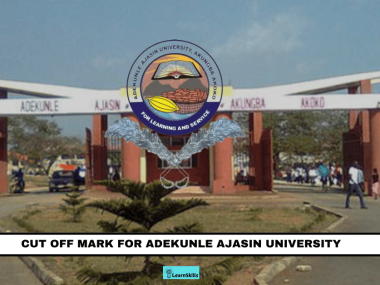When applying to Kaduna State University (KASU), knowing the cut-off marks is essential for your admission process.
For the 2025/2026 academic session, KASU has set its general cut-off mark at 150 for most courses. However, specific programs like Medicine may have higher scores and different requirements.
It’s important to keep track of any updates or changes announced by the university, as these can impact your application. By being informed and prepared, you can navigate the admission journey more effectively.
Admission Requirements
To gain admission to Kaduna State University (KASU), you need to meet specific criteria. Understanding the general requirements and those unique to your chosen faculty is crucial for your success.
General Admission Criteria
To apply for KASU, you must take the Unified Tertiary Matriculation Examination (UTME) organized by JAMB. Your JAMB score should be at least 150 to be considered for admission.
You also need five O’Level credits in subjects relevant to your course. These credits must include English Language and Mathematics. After passing UTME, you will most likely go through a post-UTME screening.
KASU uses a system to calculate the aggregate score for admissions. This score is a mix of your JAMB score and the post-UTME score.
Faculty-Specific Requirements
Different faculties at KASU may have additional criteria beyond the general requirements. For example:
- Faculty of Arts: Beyond the general criteria, check specific subjects needed for your chosen course.
- Faculty of Science: You may need to have credits in relevant science subjects like Physics or Biology.
- Faculty of Social Sciences: Some programs might expect a strong performance in social studies or economics.
Different courses have different cut-off marks, so confirm and ensure your scores match the requirements for your desired program.
KASU Academic Programs
Kaduna State University offers a variety of academic programs across different faculties. These programs cater to diverse interests and career paths, ensuring that you can find a suitable course to study.
Undergraduate Courses
KASU provides numerous undergraduate courses through its various faculties.
In the Faculty of Science, you can find programs in Biological Sciences, Physics, and Chemistry. Meanwhile, the Faculty of Arts covers disciplines like English, History, and Philosophy.
In the Faculty of Social Sciences, you can study programs such as Sociology, Political Science, and Economics. The Faculty of Law offers a Bachelor of Laws (LL.B.), preparing you for legal careers.
Additionally, the Faculty of Medicine focuses on producing competent medical professionals. Meanwhile, the Faculty of Environmental Sciences emphasizes sustainable development and natural resource management. Lastly, the Faculty of Pharmaceutical Sciences trains students in pharmacy and related fields.
Postgraduate Courses
KASU also provides various postgraduate programs aimed at enhancing your qualifications. These programs are available in multiple faculties.
In the Faculty of Science, you can pursue Master’s degrees in areas like Environmental Science and Chemistry. Meanwhile, the Faculty of Arts offers advanced studies in Literature, History, and other humanities subjects.
The Faculty of Social Sciences has Master’s programs in Sociology, Political Science, and Development Studies. The Faculty of Law provides options for LLM degrees, focusing on specialized legal fields.
The School of Continuing Education offers flexible programs, allowing you to balance studies with other commitments. Each program aims to equip you with advanced skills for better career opportunities.
Departmental Cut-off Marks
Each department has its own requirements, which can determine your eligibility for admission based on your JAMB scores and post-UTME performance.
Sciences
For the Sciences, KASU generally requires a cut-off mark of 150. This includes various programs such as Biochemistry, Physics, Mathematics, and Computer Science.
If you are applying for Statistics or Geophysics, being aware of these specific cut-off points helps ensure that you meet the necessary criteria.
A breakdown of the required cut-off marks for key programs in the sciences is as follows:
| Department | Cut-off Mark |
|---|---|
| Biochemistry | 180 |
| Physics | 150 |
| Mathematics | 150 |
| Computer Science | 150 |
Medical Sciences
The Medical Sciences have higher cut-off marks due to the competitive nature of these programs. For courses like Medicine, Nursing, and Pharmacy, you will typically need a minimum score of 180. This reflects the rigorous admission standards for future healthcare professionals.
Here are the specific cut-off marks:
| Program | Cut-off Mark |
|---|---|
| Medicine | 220 |
| Nursing | 200 |
| Pharmacy | 200 |
It’s crucial to check for any updates, as these marks can change each academic year.
Arts and Humanities
In the Arts and Humanities, the cut-off mark is usually lower, set at 150. This includes programs such as Communication and other disciplines in the humanities.
Here’s a look at the relevant departments within the Arts and Humanities:
| Department | Cut-off Mark |
| Languages | 150 |
| History | 150 |
| Linguistics | 150 |
Each department may also have additional factors that affect admission, so you should familiarize yourself with specific requirements for your desired course.
Financial Considerations
It’s essential to consider the financial aspects as the fees for the 2025/2026 academic session will play a significant role in your decision.
Tuition Fees
KASU offers a range of courses, and the tuition fees vary accordingly.
Generally, fees can range from ₦45,000 to ₦80,000 for many undergraduate programs. It is crucial to check exact figures for your specific course.
Additional Costs
Apart from tuition, be aware of other costs. You may need to budget for:
- Accommodation: Depending on your choice of living, costs can vary.
- Books and Materials: These are necessary for your studies.
- Transportation: Consider how you will commute to campus.
Financial Aid
Explore scholarship opportunities or grants offered by the university. Financial aid can significantly lessen your burden and make education more accessible. Planning will ensure you are prepared for the financial responsibilities of university life.










